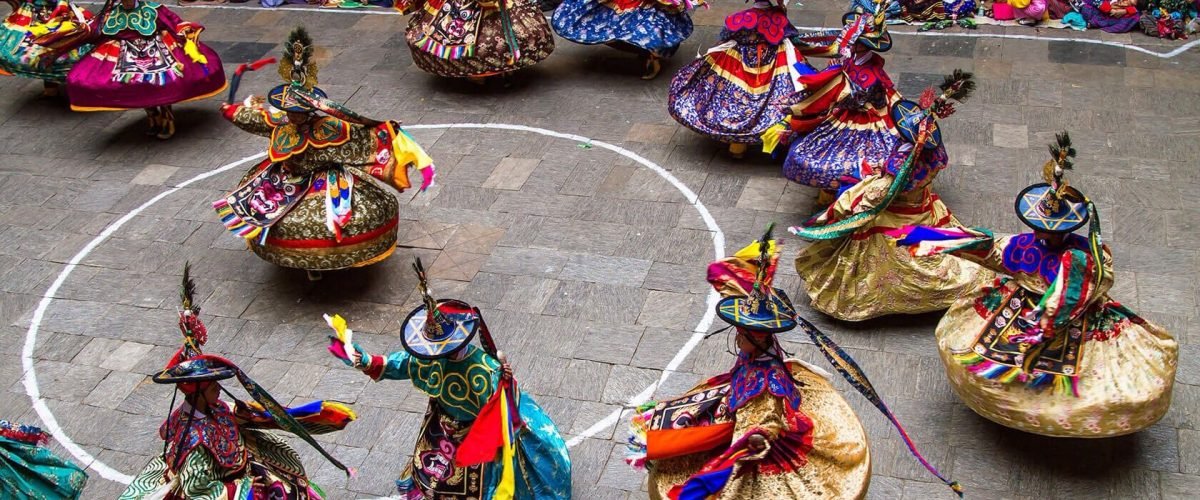Experiencing Bhutan's Festivals and Traditions
Bhutan’s festivals and traditions stand as a testament to the country’s resilience in preserving its cultural heritage.

Embark on a journey unlike any other, into the heart of the Himalayas, where the Kingdom of Bhutan unfolds a tapestry of festivals and traditions that are as vibrant as the landscapes surrounding them. Bhutan, a nation that measures its success through Gross National Happiness, offers a glimpse into a lifestyle deeply rooted in Buddhism and harmoniously intertwined with nature. This blog post aims to guide you through Bhutan’s rich cultural heritage, focusing on its festivals, or ‘Tshechus’, and age-old traditions that continue to thrive in the modern era.
Dive into the Colorful World of Tshechus
Tshechus are annual religious Bhutanese festivals held in each district’s Dzong or monastery, symbolizing the culture, traditions, and spiritual aspirations of the people. Attending a Tshechu is a profound experience that offers insight into the Bhutanese way of life, where dance, music, and spirituality blend seamlessly. The most enchanting aspect of these festivals is the Cham dances, performed by monks and laymen wearing elaborate, colorful costumes and masks. These dances tell tales of moral victories, folklore, and legends, believed to confer blessings upon the viewers and drive away evil spirits.
The Thimphu Tshechu: A Spectacle to Behold
One of the largest and most popular Tshechus is the Thimphu Tshechu, held in the capital city. This festival attracts people from all over the country and international tourists eager to witness the grandeur of Bhutanese culture. The air fills with music from traditional instruments, and the courtyards of the Tashichho Dzong come alive with vibrant colors and spiritual energy. The highlight for many is the unveiling of the giant Thongdrel (a large tapestry) of Guru Rinpoche, which is displayed at dawn on the final day, offering blessings to all who witness it.
The Unique Tradition of Archery
Beyond the festivals, Bhutan’s national sport, archery, plays a significant role in community life and celebrations. Traditional archery tournaments are a common sight and bring together communities in a display of skill, camaraderie, and festivity. These tournaments are not just about hitting the target but also involve singing, dancing, and a good-natured exchange of witty taunts. Participating in or even witnessing an archery tournament is an essential experience for understanding the Bhutanese spirit.
Preserving Heritage Through Festivals
Bhutan’s dedication to preserving its cultural identity is evident through the meticulous organization of these festivals and the participation of the local populace. For travelers, these festivals offer a rare opportunity to engage with Bhutan’s traditions and understand the philosophy that guides this unique country. The festivals not only serve as a bridge to the past but also as a celebration of the present and a hopeful glance towards the future.
Planning Your Visit
If you’re planning to experience Bhutan’s festivals, it’s wise to time your visit according to the festival calendar, which varies slightly each year based on the lunar calendar. Ensure you arrange your trip with a reputable tour operator familiar with the local customs and regulations, as Bhutan values sustainable tourism practices.
Embracing Bhutan’s Cultural Legacy
Visiting Bhutan during one of its many festivals is more than just a trip; it’s a cultural odyssey that offers a deeper understanding and appreciation of the country’s traditions and values. Whether you’re marveling at the masked dances of the Tshechus, witnessing an archery tournament, or simply enjoying the hospitality of the Bhutanese people, you’re sure to leave with a sense of wonder and a deeper connection to this magical kingdom.
Bhutan’s festivals and traditions stand as a testament to the country’s resilience in preserving its cultural heritage. For those lucky enough to experience these celebrations, it’s an unforgettable journey into the heart of Bhutan’s spiritual and cultural identity.
